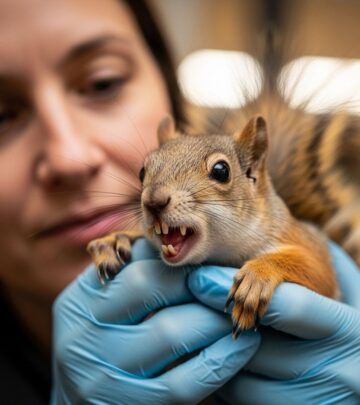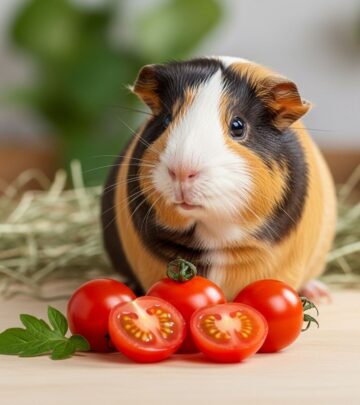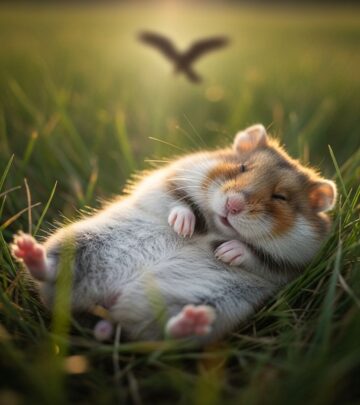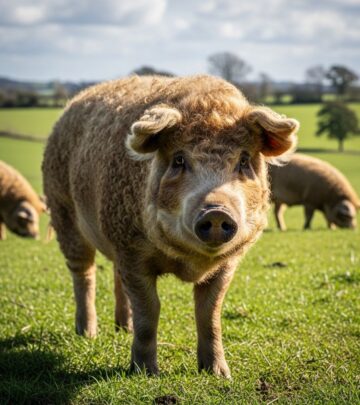Blind Mama Opossum Finds Love and Purpose After Rescue
A poignant journey of maternal strength and connections that redefines wildlife care.
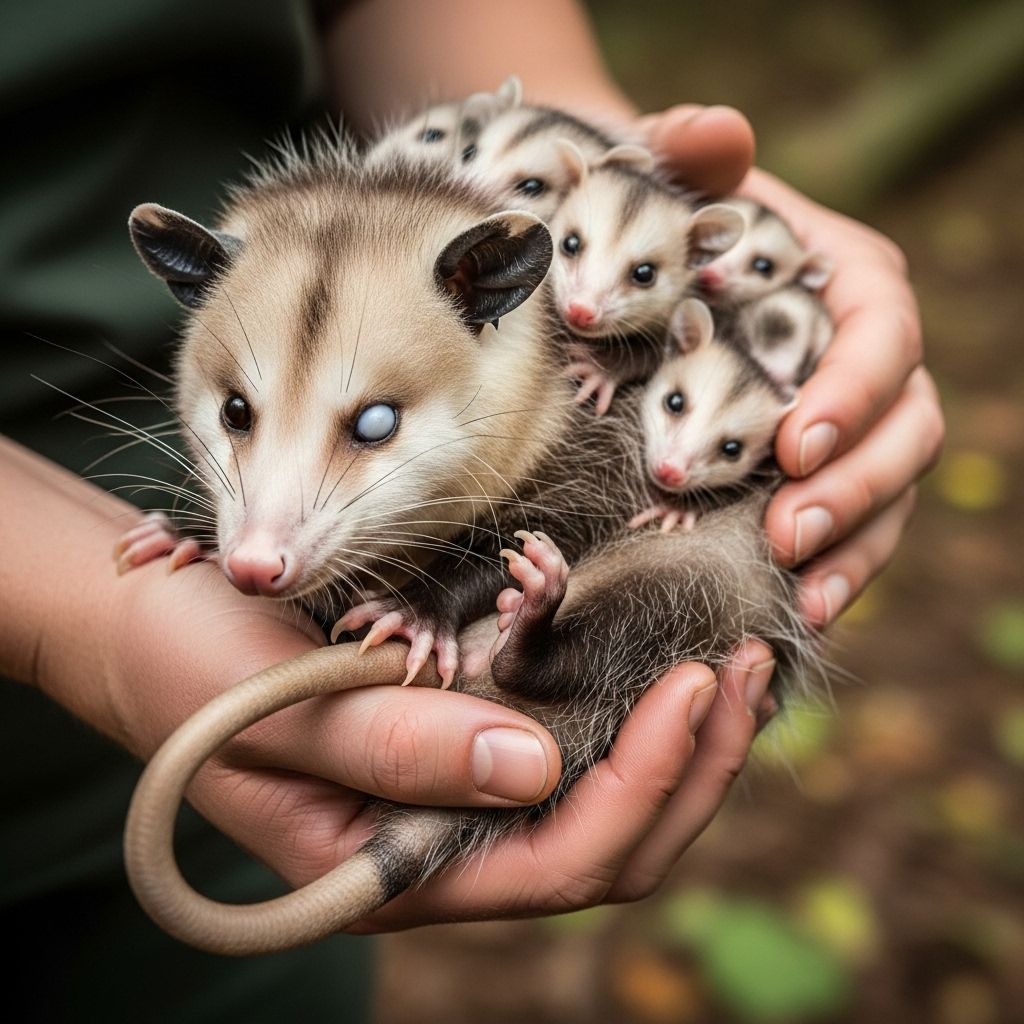
Tragedy and hope often walk hand in hand in the world of wildlife rescue. This is especially true for one remarkable blind mama opossum, whose journey from trauma to profound connection illustrates the transformative power of compassion and the resilience of the animal spirit. In this inspiring account, discover how a vulnerable creature, initially fearing for her life, ends up shaping a family and changing human hearts along the way.
Category: Animals & Wildlife Rescue
- Wildlife rehabilitation efforts
- Unique animal-human bonds
- Inspiring rescue stories
The Heartbreaking Start: A Mama Opossum in Need
The story begins with a blind opossum found wandering alone, her uncertain steps echoing the hardship she endured. Injured and disoriented, she had lost her way—and her chance of surviving on her own appeared slim. As is common among opossums, who rely on their keen sense of sight and smell to navigate, losing her vision made the world infinitely more dangerous.
When rescue volunteers first encountered her, she was deeply distressed, crying out not just in pain, but in search of connection. As documented by The Dodo, her initial cries reflected more than physical suffering; they were pleas for safety, companionship, and comfort from the world around her.
A Compassionate Rescue: Stepping In to Save a Life
Recognizing her plight, dedicated wildlife rehabilitators took her under their care. Their process included:
- Providing immediate shelter and warmth
- Assessing her injuries and blindness
- Offering specialized medical attention and gentle handling
Despite the trauma, the opossum responded positively to the kindness shown. She began to relax, allowing caretakers to guide her—and soon, the team realized that her affectionate nature reached beyond mere survival instinct. The opossum sought out gentle touches, responding to soft voices and careful caresses with unmistakable gratitude, as confirmed by footage and caretaker interviews.
Discovering a New Purpose: Unexpected Motherhood
While her blindness restricted her independence, life had other plans. During her recovery, the opossum revealed she was not alone: hidden within her pouch were tiny, orphaned babies—each dependant on her for survival. Despite her disabilities, she showed deep maternal instinct, nurturing the babies with fierce devotion.
This revelation transformed her caretakers’ approach. They now focused not only on her recovery but also on supporting her as a mother:
- Ensuring a safe, quiet environment for the opossum family
- Supplementing the mama’s diet to increase nourishment for her babies
- Monitoring the health and development of both mother and opossum babies
“She cried out not only for herself but for her family,” explained one rehabilitator. “Her love for her babies became her beacon, and she found courage she didn’t know she had.”
The Healing Power of Bonding
What followed was a profound transformation. The blind mama opossum’s cries gradually shifted from fear to communication, building a bridge of trust between species. The physical affection she demonstrated—nuzzling, gentle vocalizations, and seeking close contact—became essential to her recovery and well-being.
“It’s like she’s telling us, ‘Thank you. I feel safe now.’” — Wildlife Rescuer
Her story touches on key elements of opossum-human relationships:
- Opossums can form strong bonds with humans who show patience and empathy.
- Maternal instinct in opossums is remarkably resilient, even through injury or stress.
- Physical touch and vocal reassurance help build trust and calm fearful animals.
Raising Orphaned Babies: The Challenges and Joys
As recovery continued, the tiny opossum babies thrived under their mother’s care and the guidance of rescuers. The team worked tirelessly to support their development:
- Offering soft bedding and controlled temperatures
- Providing additional nutrition when needed
- Gently handling the babies to socialize them while ensuring the mother felt secure
Despite the odds stacked against them, every milestone—open eyes, first steps, exploratory play—became a celebration. For the blind mama, her babies represented hope and persistence. Each affectionate cry she made showed her joy in motherhood and contentment in her new home.
Why Opossums Are More Than Just Urban Wildlife
Opossums often face negative stereotypes due to their nocturnal habits and unusual appearance. However, their gentle demeanor and critical role in ecosystems deserve recognition:
- They act as natural pest controllers, consuming insects and rodents.
- Opossums play an important part in seed dispersal and maintaining ecological balance.
- These creatures are generally non-aggressive, choosing flight over fight.
| Opossum Trait | Ecological Benefit |
|---|---|
| Nocturnal foraging | Reduces disease vectors by eating ticks and insects |
| Excellent climbers | Helps maintain tree health by controlling pests |
| Non-aggressive nature | Minimizes human-wildlife conflicts |
Through stories like that of the blind mama opossum, the public can learn to appreciate these unsung heroes of our neighborhoods.
The Human Component: Empathy and Choices in Wildlife Rescue
Rescue stories are not just about the animals. They also reveal the decisions and emotions experienced by humans involved. In this case, the rescuers faced a difficult choice: whether to attempt to rewild the mama opossum or allow her to remain under care permanently.
Due to her blindness, reintroduction to the wild posed enormous risks. The consensus became clear—her quality of life mattered more than strict adherence to release protocols. The rescuers decided:
- To keep her within a safe, loving environment where she could thrive
- To ensure her babies would have a chance for eventual release, if possible
- To foster relationships that respected both the opossums’ natural behaviors and individual needs
This decision is a testament to modern principles of wildlife rehabilitation: the priority is always the welfare of the individual animal, with release into the wild as an ideal, not an absolute.
Butter’s Story: The Legacy of One Special Opossum
Butter, the little opossum rescued as a helpless baby, became the face of animal affection for hundreds of followers online. After surviving abandonment and bonding deeply with his foster human, Butter’s antics and kisses—his habit of showering his caretaker’s face with love—helped reshape public perception of opossums.
- Butter would follow his caretaker around the house, like a loyal little dog.
- He demonstrated affection through nuzzling and “schlubbing,” a behavior unique to opossums.
- Butter’s playful presence brought joy, laughter, and a sense of companionship to his household.
His story reached thousands, teaching that every animal—no matter how small or misunderstood—has worth and the potential for deep emotional connection.
The Unspoken Language: How Animals Express Love and Trust
Having raised both wild animals and pets, skilled rehabilitators recognize the significance of body language and vocalizations:
- Opossums often express affection by nuzzling, climbing onto laps, or gently touching faces.
- “Schlubbing” involves rubbing against their humans, a sign of comfort and bonding.
- Gentle cries or chatters signal a desire for companionship or reassurance.
These signals, amplified in animals who have survived trauma, illustrate the richness of their inner lives. They are not simply survival-driven creatures but beings capable of complex bonds and emotions.
Encouraging Respect for Wildlife
The journey of the blind mother opossum and her babies is a call to action for more compassionate treatment of all wildlife. Key takeaways for advocates and everyday citizens:
- Be aware of urban wildlife needs and challenges
- Support local rehabilitators and rescue organizations
- Educate others about the value and vulnerability of opossums
How to Help Injured or Orphaned Wildlife
- Observe from a distance: Do not handle unless absolutely necessary.
- Contact licensed rehabilitators: Wildlife experts can provide appropriate care and advice.
- Provide safe transport, if required: Use soft towels and quiet environments.
- Never attempt to raise wild animals as pets unless advised by professionals.
Frequently Asked Questions (FAQs)
Q: Can blind opossums survive in the wild?
A: Blind opossums face significant challenges in the wild due to their reliance on sight for navigating and avoiding predators. Most require permanent care or sanctuary.
Q: Is it common for orphaned wildlife to bond with humans?
A: Bonding occurs when animals are rescued at a young age and receive consistent, gentle care. However, rehabilitation always aims, when safe, for future release and minimal dependence.
Q: How do opossums show affection?
A: Opossums show love through nuzzling, climbing, rubbing against humans (schlubbing), and gentle vocalizations.
Q: What are the main dangers facing urban opossums?
A: Common risks include vehicle collisions, predation, disease, and, as in this story, injury or trauma resulting in physical disability.
Q: What should I do if I find an injured opossum?
A: Contact local wildlife rehabilitation experts immediately; avoid self-treatment unless you have professional training.
Conclusion: A Story that Transcends Species Boundaries
The journey of the blind mama opossum, her adopted babies, and her compassionate human rescuers is a testament to hope, resilience, and the possibility of joy in the face of adversity. These tales encourage us to look beyond mere survival and recognize the profound ability animals possess to form loving, trusting relationships—with each other and with humans willing to extend a helping hand.
If you encounter wildlife in distress, remember that simple acts of compassion can make a world of difference. Each animal saved is a lesson in grace, adaptability, and the universal language of love.
Read full bio of medha deb








